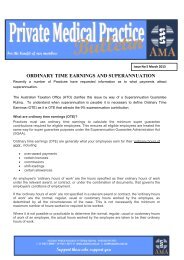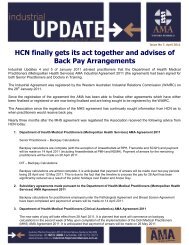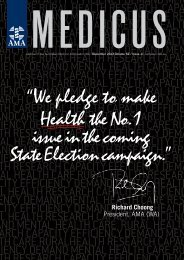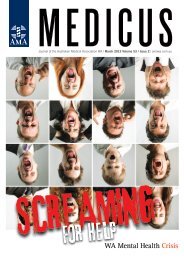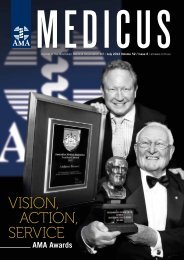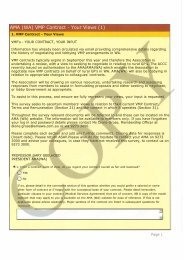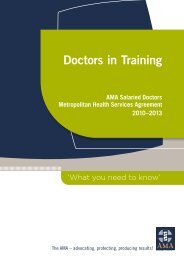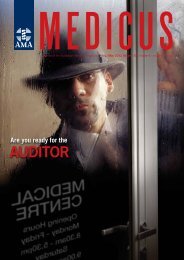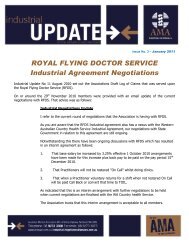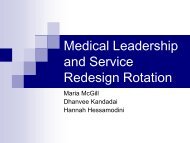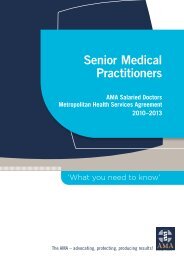twrama 1990_final oc.. - AMA WA
twrama 1990_final oc.. - AMA WA
twrama 1990_final oc.. - AMA WA
You also want an ePaper? Increase the reach of your titles
YUMPU automatically turns print PDFs into web optimized ePapers that Google loves.
INDUSTRIAL<br />
A matter of record<br />
The <strong>AMA</strong> regularly receives calls from patients of retired<br />
d<strong>oc</strong>tors needing to access or obtain a copy of their medical<br />
record. Unfortunately, the Ass<strong>oc</strong>iation is not always able to assist<br />
some of these patients due to the fact that no contact details have<br />
been provided to the <strong>AMA</strong> by the retiring d<strong>oc</strong>tor.<br />
The Privacy Act 1988 (Commonwealth) created obligations for<br />
d<strong>oc</strong>tors working in private practice. What this means for d<strong>oc</strong>tors<br />
is that:<br />
• They have new obligations to safeguard patient privacy and to<br />
give patients some control over how information is handled<br />
• They are required to be more open with patients than before,<br />
and<br />
• They are generally required to provide patient access to the<br />
information held about them.<br />
• D<strong>oc</strong>tors who are planning to retire or who are in the pr<strong>oc</strong>ess<br />
of closing their practices, regularly contact the <strong>AMA</strong> asking<br />
how long they are required to keep their medical records. In<br />
Western Australia the requirement is:<br />
• For an adult: 10 years from the date of the last consultation<br />
• For a child: Until the child reaches 30 years of age.<br />
Since the Limitation Act 2005 came into effect on 15 November<br />
2005, in <strong>WA</strong>, these general periods are appropriate. However<br />
there are circumstances where an application can be made for<br />
an extension of time with which to start legal pr<strong>oc</strong>eedings. The<br />
d<strong>oc</strong>tor should note different times apply for persons with a mental<br />
disability and indefinite retention is recommended for this group.<br />
You should also contact your Medical Defence Organisation to<br />
discuss this issue further.<br />
OPTIONS FOR STORAGE AND PATIENT ACCESS TO<br />
MEDICAL RECORDS: A retiring d<strong>oc</strong>tor has limited options.<br />
In the first instance he should attempt to have a colleague in the<br />
practice take over responsibility for the patient’s records. If the<br />
d<strong>oc</strong>tor practises on his own and is closing his practice, he should<br />
consider contacting colleagues who may be prepared to take over<br />
the patient records. If the d<strong>oc</strong>tor finds a colleague(s) prepared to<br />
take over the records, the retiring d<strong>oc</strong>tor should send out a circular<br />
advising of the impending retirement and include in the notice that<br />
the records will be held by the nominated d<strong>oc</strong>tor and the practice<br />
details.<br />
If no arrangements can be made to transfer the records to<br />
another d<strong>oc</strong>tor, then suitable arrangements must be made so that<br />
they can be easily accessed if required.<br />
It is also very important to inform patients as they contact your<br />
practice of the closing date of the practice and the new contact<br />
arrangements for accessing the patient records. If no arrangements<br />
can be made to transfer the records to another d<strong>oc</strong>tor, then suitable<br />
storage arrangements should be made and contact details provided<br />
for easy access. In this case, the d<strong>oc</strong>tor should:<br />
• Determine whether he will store the records himself or use a<br />
records management facility<br />
• If the d<strong>oc</strong>tor decides to store the records at home, he should<br />
ensure that the records are fully secured and protected from<br />
the elements (i.e. moisture etc.)<br />
• If opting to use a records management company, they should<br />
ensure they have a separate file or database of the patient’s<br />
files. Members can contact the <strong>AMA</strong> [(08) 9273 3008] for a<br />
list of records management companies. Costs for this service<br />
vary between providers.<br />
• D<strong>oc</strong>tors who have electronic medical records should ensure<br />
that backup of the data is kept in secure l<strong>oc</strong>ations. More than<br />
one backup copy should be made and stored.<br />
• Members should notify the <strong>AMA</strong>’s Membership Department<br />
of their retirement date and where their medical records are<br />
to be stored and the contact details for access to the records.<br />
An additional contact should also be provided to cover for<br />
those situations where the d<strong>oc</strong>tor is on holidays, in the event of<br />
illness or similar circumstances.<br />
The <strong>AMA</strong>, when contacted by patients seeking a copy of the<br />
patient record is then able to take the patient’s contact details and<br />
send the request to the d<strong>oc</strong>tor or the designated contact person for<br />
action.<br />
Members wishing to discuss this matter further can contact<br />
Michael Prendergast on (08) 9273 3008. ■<br />
October MEDICUS 9





